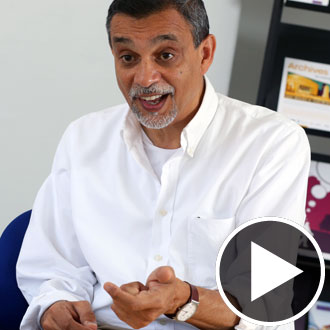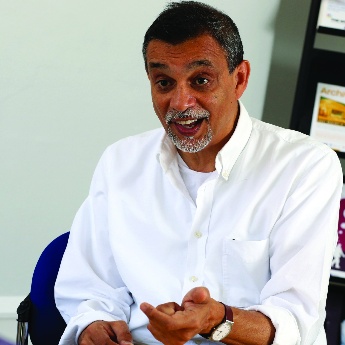Professor Aneez Esmail: ‘Let’s stop arguing and find solutions’


‘Please stop smiling and stop talking – I need some pictures of you looking serious,’ the Pulse photographer implores Professor Aneez Esmail.
It makes little difference. The professor’s natural expression is a grin, and he is chatting enthusiastically about every detail of general practice – from discrimination in the GP jobs market to how the profession must ‘stop moaning’.
The photographer finally manages to get the ‘serious’ shot during a brief lull in a conversation and Professor Esmail is allowed to continue.
It is this relentless energy that enables him to carry out his numerous roles – as a professor of general practice, a GP, the head of a research centre on patient safety in primary care and, shortly, chair of a wide-ranging review of all postgraduate medical exams.
Professor Esmail remains a prominent figure in the NHS. He was medical adviser to the Shipman Inquiry, and in recent years has been best known for his work as a champion of equality and diversity. Because of this, he was chosen to head the GMC’s independent review into the differences between the scores achieved by black and minority ethnic (BME) GP trainees and their white counterparts in the clinical skills assessment (CSA) component of the MRCGP exam.
Professor Esmail’s findings caused a major controversy last year, which at its height led to the RCGP threatening to sue the BMJ for publishing his study, in which he said ‘subjective bias due to racial discrimination may be a cause’ of the different pass rates for the CSA between white and non-white graduates.
At the same time, an international doctors’ group was taking the RCGP to the High Court over the matter. This led to a ‘toxic’ environment for all colleges, which left little scope for constructive discussion, he says.
‘When a problem arises, what do you do? You batten down the hatches. And that is what happened.’
He was invited by one royal college to bid to do its own review – but he turned the offer down when the college said it wanted him to ‘prove their exam was not biased’.
‘I was not going to prove their exam was not biased!’, Professor Esmail exclaims. ‘I was going to show them how their exam was biased, then ask how they would be able to solve this.’
Progress
The situation has progressed since then. The High Court found in favour of the RCGP, but called for action on the pass rates, and the college is now involved in seemingly amicable talks with the international doctors’ group that instigated the action, the British Association of Physicians of Indian Origin (BAPIO).
Professor Esmail has also been chosen by the BMA to chair a conference in November that will look into improving medical exams across all medical royal colleges, to try and address the differences in pass rates.
He says: ‘We’re going to try and explore some of the problems raised by my research. We have to move on and see what the solutions are. They are not just relevant to GPs – they are about the whole way we reassess people in training.
‘Part of what the BMA is doing is to act as an honest broker. Let’s get away from arguing and judicial reviews.’
Professor Esmail suggests that one possible improvement is to use real patients, rather than actors, for the CSA, the disputed component of the MRCGP that measures candidates’ performance in a mock clinical setting.
He says: ‘I know it is harder, but maybe it is a better way of testing people than creating these factories where we get these people acting as patients, getting them to grimace at the right times.’
Quickfire Q&A
What area would you like to look at for your next piece of research?
The effect of the NHS reforms. They have only been embedded for a year and a bit, but that would be from a political rather than an academic angle.
So do you think the reforms are affecting patient care?
In my practice, we have had two or three GPs who have been seconded to work more sessions with the CCG. So they are seeing fewer patients. Then people wonder why they cannot get appointments.
Can general practice flourish?
There has been a tendency over the past 20 years to super-specialise. But we are beginning to realise that we are specialising too much. Now there is a call for the re-development of the generalist. And the GP is the generalist par excellence. I am positive about it.
Is discrimination widespread in education?
Data that we have in Manchester show if you are an ethnic minority British student, you are far less likely to get a 2:1 than a white student. This applies across the whole of higher education, not just medicine. We have to understand why and we in medicine can shine a light on the reasons.
Discrimination
The MRCGP was not Professor Esmail’s first foray into controversial work on discrimination in the NHS.
In 1993, he and Dr Sam Everington – now the chair of NHS Tower Hamlets CCG in east London – produced a seminal study into discrimination in the NHS jobs market, which found white candidates were twice as likely to be shortlisted for a hospital job as BME applicants with the same qualifications. Pleasingly, he says, the situation is much better today.
‘I graduated from Sheffield in 1982. When I graduated, 10% of my class were from ethnic minorities. There were very few consultants… you look at any hospital now and you will see ethnic minority consultants across the board.
‘In terms of job applications, which was what my research was on, you can see it has almost certainly got better. You look at the RCGP – they had their first ethnic minority chair, and the membership has changed.’
This is not to say racial discrimination has been eradicated, however.
‘If you look at merit awards, you will find there is still a discrepancy. If you look at who goes in front of the GMC, there is still a disparity. I am not afraid to say it is because of discrimination.’
This discrimination can still be seen in general practice, too, he says: ‘Look at where BME GPs work – it is in inner-city Manchester, in the conurbations in the West Midlands, in east London, in the north west, in areas like this.
‘If I am an ethnic minority doctor coming out of Manchester, I have the same aspirations as anyone; I want to work in a nice leafy suburb, where I get paid well, where it is not too demanding. So I ask the question – and the answer is that these places are deprived, they are not popular with white British graduates and BME doctors end up in those areas.
‘I think there is selection that goes on – you advertise for practice partners and you tend to choose someone like you. It is a phenomenon in all parts of society.’
Big Interview with Professor Aneez Esmail
Paint a positive picture
This is particularly apt given the recruitment problems engulfing general practice. Professor Esmail still practises in Manchester for three sessions a week and his ideas about how to attract more medical graduates into GP training involve the profession taking action itself.
‘I think many GPs just moan about the profession. They have to stop moaning. They have to talk it up, not talk it down.’
Relations with the RCGP may not be as fraught as they were amid the tensions last year, but Professor Esmail pulls no punches about the college’s latest campaign to highlight the lack of funding given to general practice.
He says: ‘I don’t know where they got the bloody advice from! We refused to put the posters up in our practice. We’re not going to tell patients it is terrible in general practice.
‘How about a campaign saying every patient should have a right to a 20-minute appointment, instead of moaning about general practice closing? What a negative picture to paint.
‘I say to my students that it is the best specialty you can imagine but it is easy to do badly and is hard to do well. It requires high-level skills and the best candidates.’
Professor Esmail grins once again and concludes: ‘I went into medicine to see a range of problems and their complexity, and to be charged with solving them. I can do that in general practice.’
CV
Age
57
Family
Married with three children
Education
Qualified in 1982 from the University of Sheffield. He completed training as a GP in 1987 and as a public health physician in 1992. He obtained his PhD from the University of London in 1996.
Career
1992 – present
GP partner, Robert Darbishire Practice, Rusholme, Manchester
1996 – 2001
Head of the School of Primary Care, University of Manchester
2001 – 2004
Medical adviser to Dame Janet Smith, the Court of Appeal judge who chaired the Shipman Inquiry
2004 – 2007
Co-chair of the BMA Equal Opportunities Committee
2005 – present
Professor of general practice, University of Manchester, teaching public health
2006 – present
Associate vice- president for equality and diversity, University of Manchester
2012 – present
Director of the Greater Manchester primary care patient safety translational research centre.












